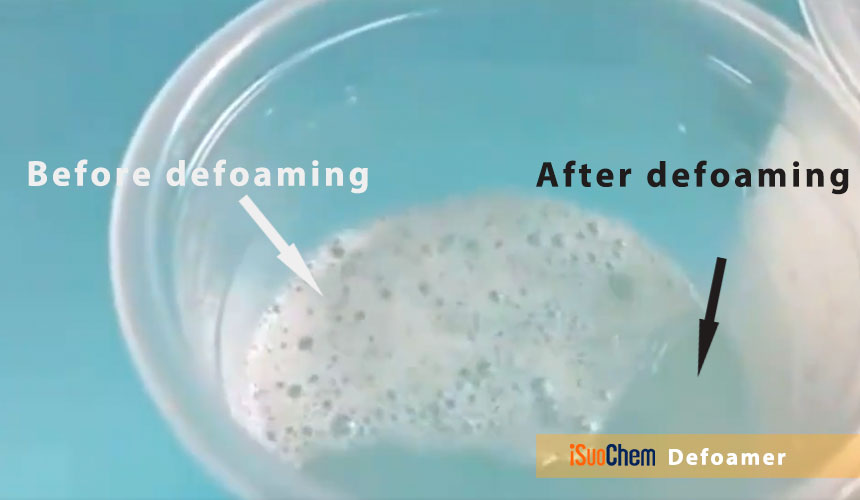Discover the Top Benefits of Utilizing Defoamers in Industrial Processes
The application of defoamers in industrial procedures provides a variety of compelling benefits that can boost functional performance and item top quality. By successfully regulating foam manufacturing, these representatives not only optimize product flow however additionally contribute to substantial cost reductions and improved sustainability. The implications of taking on defoamers might be extra extensive than at first viewed.
Improved Refine Performance
Enhancing commercial processes typically entails resolving frothing concerns, which can hinder functional efficiency. Foam development can interfere with the appropriate performance of devices, reduce the effective use of resources, and make complex the tracking of vital criteria. By carrying out defoamers, sectors can efficiently alleviate these issues, leading to streamlined procedures and boosted efficiency.
Defoamers work by destabilizing the foam framework, permitting rapid collapse and considerable decrease in foam quantity. This action not only improves the flow of products via tools, such as pipelines, activators, and mixers, yet likewise lessens disturbances brought on by foam overflow. Devices downtime is minimized, permitting for a more continual and efficient production process.
In addition, making use of defoamers can result in decreased power consumption. With much less foam to handle, compressors and pumps can run much more successfully, resulting in reduced operational prices and an overall improvement in procedure throughput. Eventually, the strategic use of defoamers not only addresses instant frothing difficulties but additionally adds to a more reliable commercial ecological community, promoting a competitive benefit in a demanding market.
Improved Item Quality
The combination of defoamers in industrial processes plays an important function in boosting item quality. By effectively regulating foam development, defoamers add to the uniformity and harmony of end products. Extreme foam can bring about aeration, which negatively impacts the structure and stability of solutions, specifically in markets such as food and pharmaceuticals, beverages, and finishes.

Additionally, defoamers help with better blending and dispersion of ingredients, leading to homogeneity in formulas. This is crucial in applications where accurate component proportions are essential for performance and safety. In addition, the elimination of foam can reduce the threat of contamination during manufacturing, more safeguarding item stability.
Ultimately, by enhancing product high quality, defoamers not only boost consumer fulfillment but also enhance brand online reputation. Their role in maintaining top notch standards highlights their relevance in contemporary industrial procedures.
Cost Reduction Advantages
Executing defoamers in commercial processes can cause significant cost decrease advantages. By effectively controlling foam development, defoamers lessen item loss during production, thereby maximizing material use. This reduction in waste converts straight into lower resources expenses, enhancing overall operational efficiency.
Moreover, making use of defoamers can decrease energy usage. Excessive foam can hinder equipment performance, causing raised energy demands to preserve production levels. By minimizing foam, defoamers facilitate smoother operations, allowing equipment to run extra successfully and decreasing energy expenditures.

In addition, defoamers can reduce processing times. By utilizing defoamers, markets can simplify their procedures, leading to faster turnaround times and improved throughput.

Environmental Impact Reduction
In industrial procedures, the use of defoamers plays a vital function in mitigating environmental influences related to foam generation. Foam can cause considerable functional inadequacies, resulting in increased discharges and waste generation. By properly regulating foam, defoamers help maintain procedure performance, consequently decreasing the total environmental footprint of operations.
Additionally, extreme foam can overflow containment systems, bring about spills that might contaminate dirt and water sources. Defoamers aid lessen this threat by making certain that foaming does not exceed recommended restrictions, promoting conformity with environmental policies. This positive strategy not only safeguards ecosystems however additionally enhances the sustainability of commercial methods.
In addition, the usage of defoamers can reduce energy intake in various procedures. defoamers. Reducing foam formation reduces the need for added energy-intensive measures, such as enhanced agitation or pumping, which may otherwise be needed to handle foam. As a result, the adoption of defoamers aligns with more comprehensive sustainability objectives by advertising power effectiveness while lessening the carbon impact of commercial activities.
Ultimately, incorporating defoamers into commercial procedures is a tactical procedure that sustains environmental stewardship and accountable resource monitoring.
Versatility Across Industries
Throughout various sectors, defoamers show amazing convenience, adjusting to the particular needs of diverse applications. In the food and drink sector, for example, defoamers are get redirected here essential to keeping item high quality by stopping foam development throughout handling, which can affect texture and flavor. Similarly, in the pharmaceutical industry, defoamers make certain the stability of solutions, improving item effectiveness and uniformity.
In the chemical manufacturing realm, defoamers promote smoother operations by decreasing foam in reaction vessels, therefore boosting return and decreasing downtime. The paper and pulp sector depends on defoamers to improve the efficiency of pulp processing and paper manufacturing, making certain ideal product integrity. In addition, in wastewater treatment facilities, defoamers play a vital function in controlling foam during aeration processes, resulting in better therapy results.
The convenience of defoamers encompasses the oil and gas market, where they assist in managing foam in exploration fluids and manufacturing procedures. By customizing solutions to meet details sector needs, defoamers offer as crucial devices that improve functional performance, item high quality, and total process effectiveness across a plethora of sectors. Their versatility underscores their value in modern-day commercial applications.
Final Thought
Finally, the usage of defoamers in commercial procedures offers many benefits, including enhanced performance, improved item top quality, significant cost decreases, and favorable environmental visite site effects. Their capability to properly manage foam development contributes to functional connection and resource optimization. The versatility of defoamers throughout diverse markets emphasizes their important duty in advertising sustainable practices and success. The integration of defoamers stands for a calculated approach to addressing challenges connected with foam administration in numerous manufacturing settings.
Ultimately, the critical usage of defoamers not just addresses instant foaming difficulties however additionally contributes to a more effective commercial ecosystem, fostering a competitive benefit in a demanding market.
In commercial processes, the usage of defoamers plays a crucial role in mitigating ecological effects associated with foam generation. By successfully regulating foam, defoamers assist preserve process effectiveness, therefore lowering the general ecological impact of operations.
In addition, in wastewater therapy facilities, defoamers play a vital duty in controlling foam during aeration processes, leading to improved therapy end results.
.png?width=250&height=140&name=35722%20BOR%20Defoamers%20Ad_V8-BACKGROUND%20(2).png)